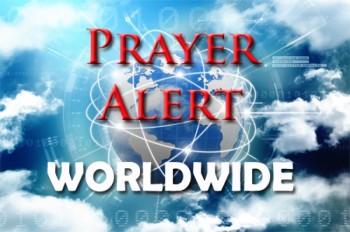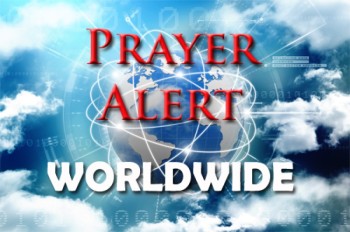Displaying items by tag: Africa
Somalia: al-Shabaab replacing al-Qaeda
On 2 September, al-Shabaab terrorists killed 18 civilians and destroyed several relief trucks in central Somalia. Al-Shabaab has increased attacks over the summer. In August they killed several Somali soldiers and attacked military bases in Kenya, Mali, and Ethiopia. An attack on a Mogadishu hotel lasting 35 hours killed 21 people. Its leaders want to replace al-Qaeda and expand their reach. Al-Qaeda has not found a leader to replace Ayman al-Zawahiri. If one is not chosen soon, al-Shabaab could declare its East African government separate from al-Qaeda and hope to overthrow the government of Somalia itself. They are receiving resources through forcing people to pay taxes by threatening them, bombing their businesses, or kidnapping their daughters. Despite the danger, many continue to share the story of Jesus. These are not US or European missionaries; they are Muslim background believers living in close proximity in the same culture. World Mission sends them solar-powered audio Bibles in the local language.
Sudan: court hearing for Christians accused of apostasy
Four Christians in Darfur accused of apostasy will have their first court hearing on 30 August. The prosecutor and investigator will present evidence, after which the judge will decide whether to continue the case or acquit the defendants. The four were arrested on 22 June following a raid on a Baptist church, accused of apostasy and subsequently released on bail. They were physically mistreated during their detention. They are charged under Penal Code Article 126, which criminalises apostasy, even though that article was abolished in 2019. Due to fears of community and police harassment, the four believers remain in hiding. There continue to be other reports of harassment of Christians in Darfur. Please pray for the judge to dismiss the case against them, and for physical and emotional healing.
Mozambique: Islamists behead Christians
On 30 July Islamist militants beheaded two Christian men during an attack on a minibus in northern Mozambique in Cabo Delgado. IS of Mozambique, known locally as al-Shabaab, claimed responsibility for the killings: its statement declared, ‘By the grace of God Almighty, the soldiers of the Caliphate killed two Christians, beheading them, and shooting them with weapons.’ In June IS beheaded several Christians in Cabo Delgado, and another during a raid on a Christian village in Nampula. Cabo Delgado is called ‘the Land of Fear’ owing to persistent brutal violence meted out against both Christians and moderate Muslims over several years. Pray that the Lord will comfort the family and friends of the Christians so brutally murdered. Ask that the violence perpetrated against Christians and moderate Muslims by IS militants will come to an end, that the LORD will rescue His people from their powerful enemy, from their foes who confront them.
Ethiopia: prayer needs
Ethiopians have a catastrophic hunger crisis after four failed harvest seasons due to drought. There are dire predictions for the autumn harvest. 91% of people in southern Ethiopia live in rural areas, depending on livestock and agriculture to survive – the backbone of Ethiopia’s economy. All grazing lands and water sources have dried out. Livestock and crops have perished. There are severe food shortages. People travel for hours searching for water. This responsibility falls to women and girls, putting them at risk on dangerous routes. Girls are also missing school. Pray for agencies to provide adequate nourishing food and clean water where it is needed. Pray for people to feel God’s love and comfort surrounding them. Pray that there will be no long-term side effects or medical conditions due to hunger. Ask God to bring the rainfall that is needed; may this lead to abundant harvests and water sources springing up again closer to communities.
Global: refugees
The UN expects five million people to flee Ukraine. The world was already facing the highest levels of displacement on record. The war in Syria killed 400,000 and destroyed healthcare, education, and infrastructure, forcing millions to cross treacherous waters to safety. An estimated 745,000 people crossed the border from Myanmar into Bangladesh after violence erupted in Rakhine state. The rapid movement and huge influx of Rohingya refugees put massive strain on existing refugee camps like Cox’s Bazar and on the host communities who are supporting new arrivals. Every day 37,000 people across the world flee their homes due to persecution or conflict; 26 million people flee their homes annually due to climate-related disasters; and one in five refugee or displaced women are estimated to have experienced sexual violence. In this season of global recessions, pray for adequate financial donations to be given to agencies delivering life-saving aid to refugees. Pray for ample food, water, sanitation, blankets and shelters to reach the vulnerable.
Nigeria: a dangerous society
In 2017 Fulani militants seized a Christian mother’s land and burned down her house, forcing her and her family to move closer to the city for safety. Loss of their farmland forced the family of seven into deep poverty, living and sleeping in one room. On 8 August Fulani militants attempted to rape her 16-year-old daughter while they were out walking. A missionary visited the family after the attack and the mother said, ‘They told us to stop, then they beat me as I tried to stop them from raping my daughter.’ She showed the deep gash in her arm she received from the militants, and said God used her to protect her daughter from public disgrace and shame, which is how victims of rape are viewed in their society. ‘I have nothing to say but thank God. Please tell Christians to pray for us. Pray that we will return to our village one day. Life is too expensive in the city.’
Kenya: justice for victims of police brutality
IJM reports, ‘Last week we celebrated justice for IJM lawyer WK, his client and their driver. Three police officers and one civilian were convicted of their murder’. Prior to 2016, few police officers had ever been convicted for murder - despite many instances of police abusing power. But in the past five years, 45 officers have been convicted on murder or manslaughter charges. This gives hope to victims and families of police abuse that justice is possible. ‘Also, praise God for the acquittal of an innocent IJM client in Kenya. He was framed for a crime he didn't commit. During the trial, the prosecution failed to produce any witnesses. He is now free, but please pray for him to be protected from further false accusations.’
New way of farming produces a harvest
Craig's farm was seized by Zimbabwe’s government in 2003, forcing his family to move to Harare. He joined a Foundations for Farming group and began teaching the new owners and other small-scale farmers a unique way of farming revealed by God - farming without tillage or burning. He immediately got a 10% increase in yield. He started to grow it bigger, but he knew that God had given him this revelation not for himself but to share across Africa to the rural farmers, the hurting, the poor ones. Zero-tillage technique caught the attention of the government, which endorsed the method. In 2020 Zimbabwe experienced its first food surplus in two decades and now Foundations for Farming teaches the technique all over the world, with the main goal of sharing the Gospel. ‘80% of what we teach is the heart, using agriculture as an entry point for the gospel.’
Ghana / Ivory Coast: Marburg virus
Ghana has confirmed two deaths from the Marburg virus, a highly infectious disease in the same family as Ebola. No treatment yet exists for Marburg. Ghana Health officials said 98 people were under quarantine on 19 July. The symptoms of the severe, often fatal illness include headache, fever, muscle pains, vomiting blood and bleeding. Doctors advise drinking plenty of water and treating specific symptoms to improve a patient's chances of survival. The virus is transmitted from fruit bats and spreads between humans through bodily fluids. On 20 July, the Ivory Coast raised a Marburg alert in response to there being a ‘high risk of spreading’ and any suspected cases should be immediately flagged. They want careful sample collection and transit protocols. Also the World Health Organisation said it’s supporting a national investigative team in Ghana, and is also alerting neighbouring countries considered high risk.
Global: Christians persecuted and displaced
When our brothers and sisters are displaced because of their faith in Christ, we can support them through prayer. As we pray, we open our hearts to their needs and grow deeper in fellowship with them. Pray for the Lord to meet all their needs. (Philippians 4:19) Pray for their healing from physical and emotional trauma. (Psalm 147:3) Pray for them to be able to love and forgive their persecutors. (Matthew 5:44) Pray for persecutors to repent and trust in Christ. (Luke 15:10) Christians in Burma, China, Eritrea, India, Iran, Nigeria, North Korea, Pakistan, Russia, Saudi Arabia, Syria, and Vietnam are persecuted by their governments and religious freedom is violated. Afghanistan, Algeria, Azerbaijan, Bahrain, the Central African Republic, Cuba, Egypt, Indonesia, Iraq, Kazakhstan, Malaysia, Sudan, and Turkey are countries whose governments allow or engage in ‘severe violations of religious freedom.’. Take time to pray for Christians in these nations.









